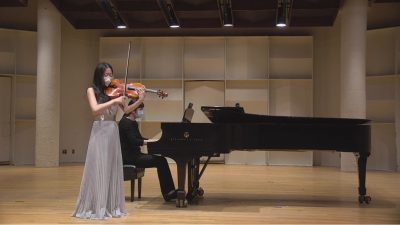Thirteen Boston University students were set to perform at Carnegie Hall in New York City in March. After enduring a challenging competition process, they were disappointed to receive the news that all Carnegie Hall performances were canceled for the remainder of this year.

However, their concert in New York is rescheduled for March 4, 2021. BU’s College of Fine Arts also highlighted some of these students during Alumni Weekend, which normally includes only a performance from one of the school’s orchestras.
Christopher Dempsey, director of production and performance at CFA’s School of Music, incorporated some Carnegie Hall performers with the other ensembles they had billed for the Alumni Weekend event on Sunday.
“We’re still able to do, not the same thing we had done in the past, but something new and different,” Dempsey said. “That was very exciting, and I think most of the students were very pleased with what they came up with.”
The hour-long, pre-recorded concert consisted of four soloists, followed by BU’s Wind Ensemble, the BU Singers and BU Symphony Orchestra. When performers — especially wind instrumentalists — couldn’t wear masks on stage, they kept a physical distance from one another.
Michael Duffett, a second-year Doctor of Musical Arts student in violin performance, was one of the event’s selected performers. Auditions were held at CFA in late 2019 and Duffett was chosen as one of the instrumentalists.
When Duffett found out he would perform at Carnegie Hall, he said he had expected his excitement to be short-lived because of the pandemic.
“I already mentally thought that it probably wouldn’t happen, so it wasn’t a huge disappointment or shock,” Duffett said. “I mean seeing the words on my screen were a little bit, but I kind of knew that it was going to happen.”
Being able to still perform remotely was important for Duffett, especially because the recording from Sunday’s performance is usable for the future.
“It’s always great to have an actual professional recording of yourself,” Duffett said.
While the recording sessions were all held in socially-distanced settings — either in CFA’s Concert Hall or from home — performers said they still served as precious opportunities to come together.
Jennifer Wang, a first-year DMA student in violin performance, performed with BU’s Symphony Orchestra. She said the recording sessions were a chance to bond with her fellow performers again through music.
“It’s when we get together to hear each other, that’s where the musical conversation starts to go on,” Wang said. “Only when at least two musicians come together and put the music together, I think that’s where the creativity comes out.”
However, challenges arise when doing socially distanced performances. Duffett said the space between instrumentalists makes it difficult to hear one another.
Wang said the unfamiliarity of maintaining distance between each of them led to communication issues during the rehearsals, and the placement of speakers in the room didn’t improve the situation. They once could share a music stand and pick up on changes in the performance, she said, but now those simple movements are much harder.
“We were all masked, and we are so far apart,” Wang said. “It’s so hard to communicate to a point we need to send out emails to list out all the little changes, and we also know there are remote students who are watching the rehearsals and playing along, so we need to communicate with them as well.”
Other than the communication difficulties between performers, Wang said the absence of physical audience members made the recording sessions feel more like rehearsals, and like something was missing.
“It’s a conversation between three people: the composer, the performer and the audience,” Wang said. “And the audience is taken away during this time.”
Despite losing this live element, technology has helped the performers navigate the pandemic. With the transition to entirely pre-recorded concerts, many performers, like Duffet, have had to change their approaches to music.
“Usually you rely on your ears quite a lot in orchestra, but people are so far away that you have to rely on your eyes a lot more,” Duffet said. “It was definitely something that was a bit of a learning curve, but I think we did well in that regard.”
In spite of these shortcomings, Dempsey said, the performers demonstrated their resiliency in continuing their concert.
“We showed that we’re able to make music in these times,” Dempsey said.
























































































































